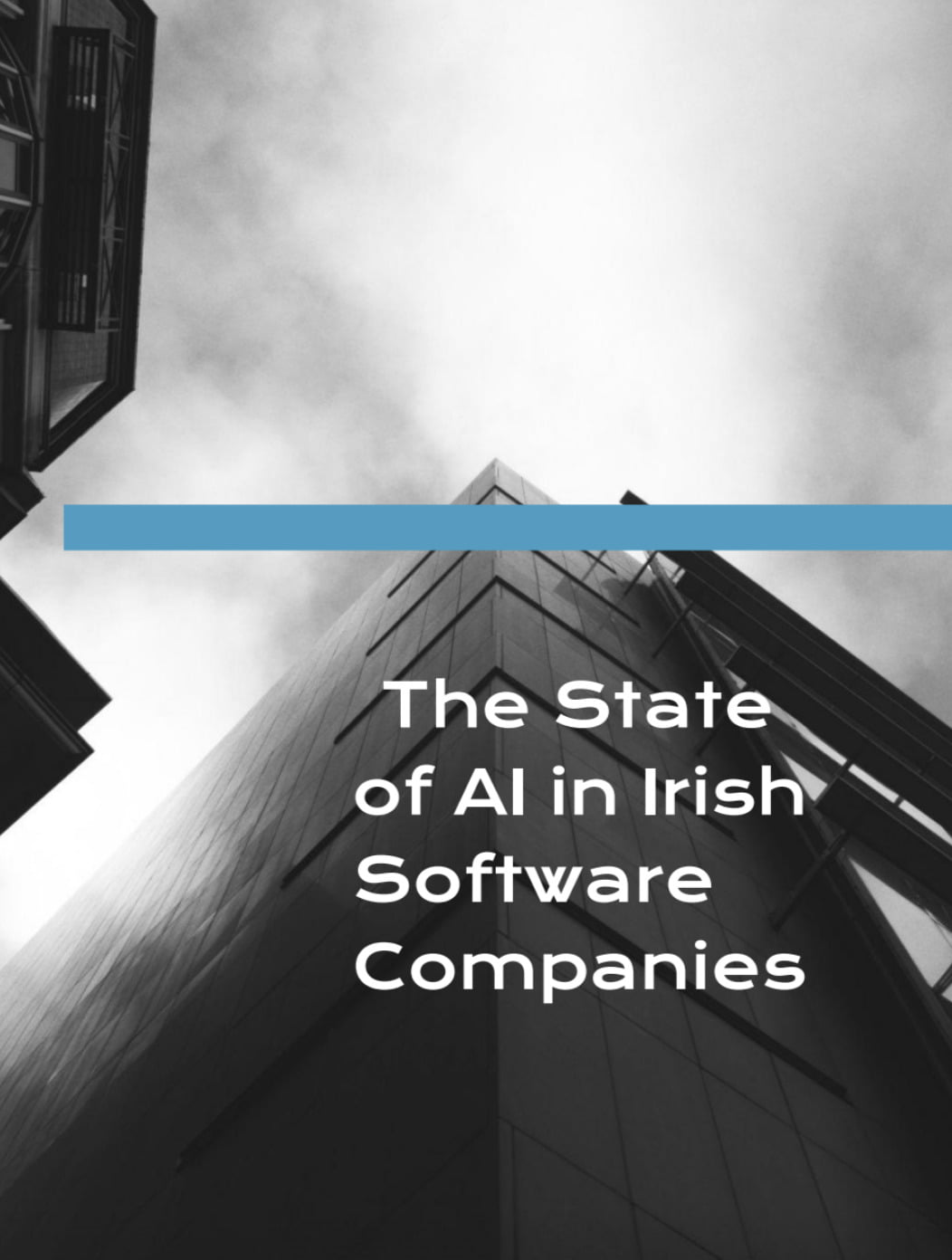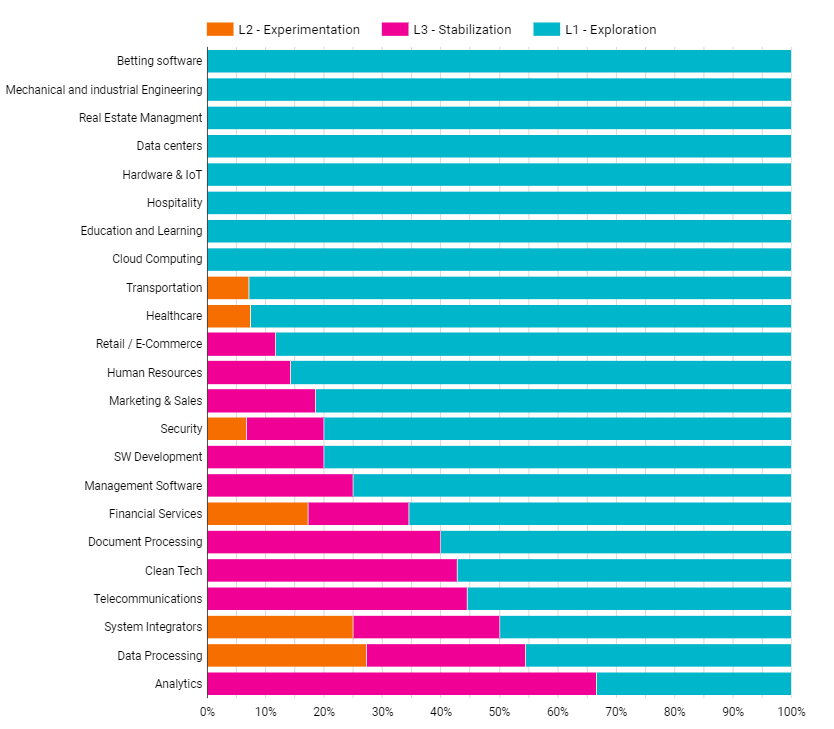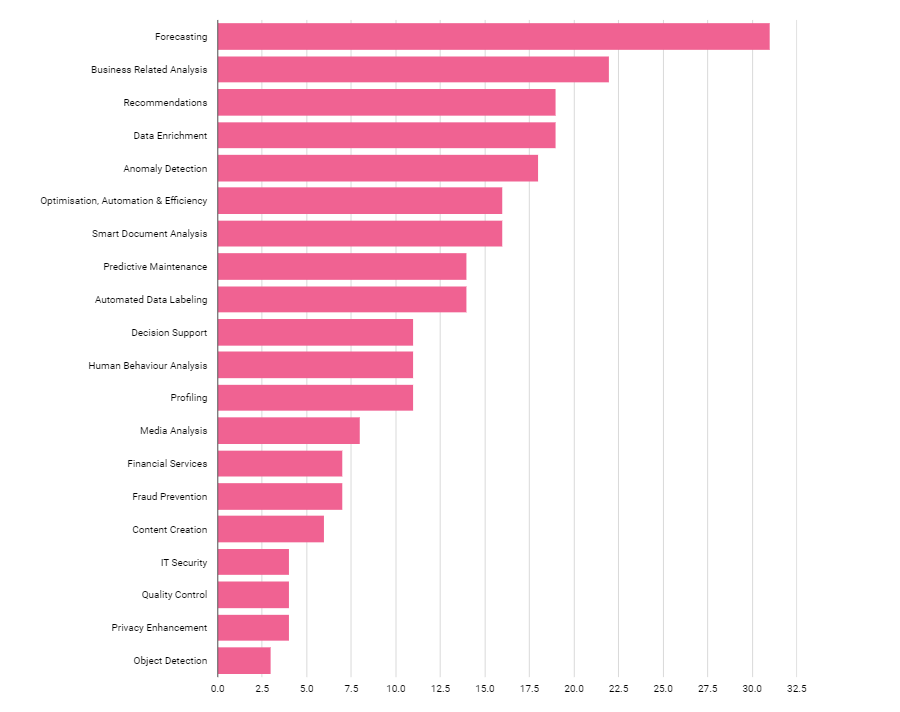77% of Irish software companies are missing out on the growth potential afforded by AI
Our team researched the state of artificial intelligence in Irish software companies. To our knowledge, this is the first in depth research into the use of AI in business in Ireland. The findings show that only 22.7% of ...

Our team researched the state of artificial intelligence in Irish software companies. To our knowledge, this is the first in depth research into the use of AI in business in Ireland. The findings show that only 22.7% of companies have implemented AI applications to improve their business performance.
This is somewhat surprising. Over the past decade, Ireland has witnessed huge technological advances. Nevertheless, Artificial Intelligence is still uncharted territory for many Irish companies. This research gave us insights into the most common and more profitable applications of AI in the Irish business landscape.
Why should Irish companies implement AI applications? What are the benefits?
Artificial intelligence offers many possibilities to improve business performance. Its main purpose is to solve problems and perform tasks which are too difficult or time consuming for human beings.
AI could help increase revenues, suggest to a manager what the next best course of action would be, or spot faulty products in an assembly line. It can perform these tasks in a very short amount of time.
Once a business owner, an engineer, or a project manager spots a specific area of improvement, AI applications can help address that specific problem in a very effective and efficient way. There are countless examples of how companies can benefit from AI applications. Here are just some of the most popular:
- Business Results Improvement
- Privacy & Security Improvement
- Data Improvement
- Quality Control & Improvement
- Analysis Improvement
- Decision Making Facilitation
- Better Automation
- Cost Saving
The benefits and the possibilities are virtually endless. If AI offers so many advantages, why is the percentage of Irish companies, which have deployed it into production, so low?
Findings from our research into the state of AI in Irish software companies
The purpose of our research was to find out which industry sectors make the most out of technology, what AI applications could improve business performance, and what business goals Irish companies have achieved through the use of AI. Our researchers analysed a sample of 150 software companies based in Ireland.
These industries range from finance to manufacturing and transportation. The main focus of this research was on small and medium enterprises, which account for 28% and 54% of the sample respectively.
After assessing the companies’ AI readiness level, our researchers found that 77.3% of them have not implemented any AI solutions to date. They are indeed still considering how AI could be beneficial to their business. Only 20% of medium sized companies and 10% of small companies have already deployed AI solutions.
It is also important to note that very few companies are currently experimenting with AI to improve their business performance. The graph below provides a visual representation of Irish software companies’ AI readiness level by sub-sector.

Which industry sub-sectors have implemented AI to improve their business performance?
In the course of this research, we identified 23 industry sub-sectors. Only 13 of them have deployed artificial intelligence applications into production. Irish companies working in eight of these sub-sectors have not even started experimenting with AI solutions. These include emerging as well as niche industries.
Some examples of these sub-sectors are companies operating in the fields of betting software, cloud computing, and data centres. Most of the companies working in these areas are small-sized enterprises.
Medium-sized businesses instead have more successfully experimented with AI solutions. They have adopted AI in sub-sectors like analytics, telecommunications, cleantech, and data processing.
Another distinction to be made is the one between Irish software companies working in the secondary and tertiary sector. The latter is by far the most advanced, both in terms of AI implementation and experimentation.
Our researchers analysed which business goals have been achieved through the use of AI applications by the companies in the sample. The graphical representation below shows the list of use cases, sorted from the most common to the least common.

Why are so many Irish companies missing out on the growth potential afforded by AI?
This is a complex question to which we cannot give a generalised answer. Every situation is different and there are many factors to consider before investing in a new technology. Our research shows that many companies have used AI to improve their ability to forecast future events. Others seized the opportunity to increase revenue and time efficiency.
Many of the 150 software companies pursue these goals, but organisations have different business needs depending on their size and industry. Medium-sized companies have made the most out of artificial intelligence so far. Their structure is quite flexible and they can afford internal and external technical expertise.
After profiting from the use of AI, these companies are keen on exploring AI’s potential in addressing different business areas. Small enterprises are generally eager to implement new technologies, but are not able to do so on a large scale. This might be due in part to the lack of internal expertise.
We should also consider that companies working in niche markets have to tackle very specific business problems. Most companies start their experimentation process with AI applications available ‘off-the-shelf’. These solutions work very well, but they are usually very generic. This means that they might not be able to support specialised business fields and industries.
No one size fits all
Let’s go back to the main question in this article, why are so many Irish companies missing out on the growth potential afforded by AI? In our opinion, part of the answer is that most companies find it hard to understand which AI solutions better suit their needs in terms of budget and business scope.
When choosing between an ‘off-the-shelf’ and a custom solution, the first might sound more appealing. There are plenty of companies selling ready-to-use AI solutions for every budget.
These applications are easily accessible and relatively fast to put into production. They usually require little technical expertise and the maintenance is managed by the vendor. This sounds great!
So, why would a business even consider custom AI solutions? For a start, ‘off-the-shelf’ solutions are designed to address very generic issues. As we mentioned earlier, companies working in niche sectors have very different business requirements compared to mainstream industries.
They manage very specific sets of data and have specialised business processes. In these cases there is often no ‘off-the-shelf’ solution available on the market.
In the second place, with ready-to-use AI solutions, dozens of companies are adopting the same application which uses exactly the same algorithm. This means that smaller companies in particular will find it hard to gain competitive advantage and will have to pay for features that they might not even need.
Custom AI solutions could help SMEs improve their business performance
Custom AI solutions are implemented to meet very specific business needs. Some of the benefits of choosing custom AI applications for business are:
- They address specific business requirements.
- They are built around existing business processes and not the other way around. This means that the integration of the new tool with the existing processes is straightforward. There is no need to change the company’s business model to match the way the specific AI application works.
- They enable companies to make the most out of their competitive advantages. The custom AI application will allow the company to present a unique solution to the market.
- The development, testing and outcome of a custom AI solution is specific to the particular set of data the company is working with.
Generally speaking, custom AI solutions enable companies to implement dedicated technological applications that best fit their clients’ legitimate needs and demands. We know that many companies, smaller ones in particular, don’t have the internal expertise necessary to develop custom AI applications and think that recruiting external expertise is too expensive. However, that is not always the case.
In fact, custom solutions are not the exclusive prerogative of big-techs with billion-dollar revenues. They can be accessible and affordable to both small and medium enterprises.
It is true that the initial cost of a custom project could be higher compared to buying an ‘off-the shelf’ solution. However, the cut in recurrent costs and the improvement in the company’s business performance could shortly absorb the initial expenses.
Final Thoughts on How AI Can Boost Business Performance
We have no doubt that more Irish companies will implement AI applications into their business. The question here is not if but when. It is only a matter of time before businesses in Ireland will become fully aware of the benefits and the cost-effectiveness of this technology.
From our perspective, we firmly believe that the technological transition towards artificial intelligence could be significantly sped up through the implementation of custom AI solutions. Because specific problems require specific solutions.



